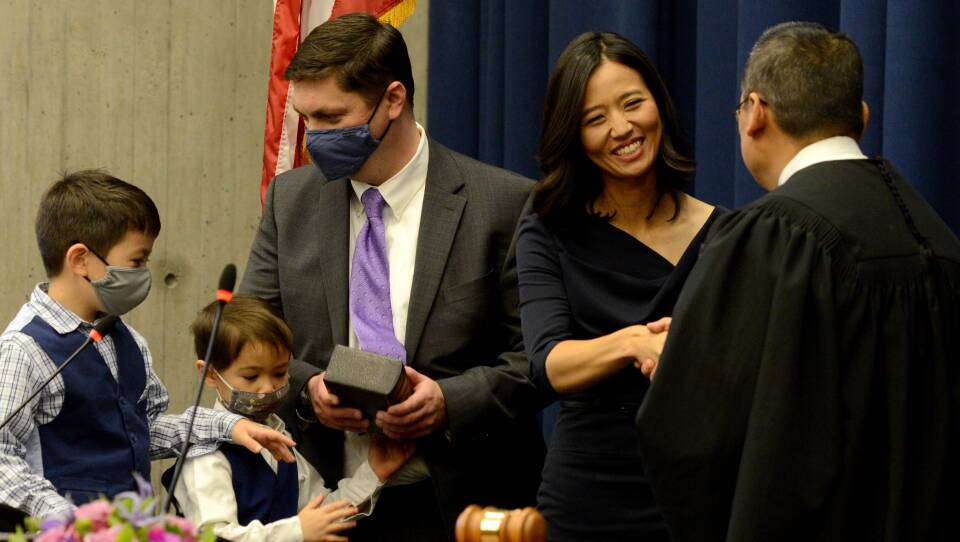Updated Tuesday at 6:35 p.m.
Michelle Wu — born near Chicago 36 years ago to immigrant parents, educated at Harvard and who served eight years on the Boston City Council — was sworn in Tuesday as the city's new mayor, the first woman and first Asian American to be elected.
“The first time I set foot in Boston City Hall, I felt invisible. But today, I see what's possible in this building,” Wu said after taking the oath of office beside her husband and two sons.
Wu's first stint in City Hall was in 2010 when she served as a Harvard Law School fellow under former mayor Tom Menino. Long thought to have her eyes on the mayor's seat, she was one of former mayor Marty Walsh's most persistent critics and declared her bid for his job before President Joe Biden tapped him to be labor secretary. Wu broke the 200-year plus stranglehold that white men held on the city's top job by forging a new coalition of progressive, Black, Latino and young voters.
The inclusive message was echoed in her remarks as she vowed to "get City Hall out of City Hall" and into Boston's neighborhoods.
"Boston, our charge is clear," Wu said. "We need everyone to join us in the work of doing the big and the small. ... The reason to make a Boston for everyone is because we need everyone right now."
Boston Municipal Court associate justice Myong J. Joun administered the oath of office to Wu, who swore on a copy of the historic Aitken bible on loan from the Boston Public Library. The Aitken Bible, Wu’s team said, represents an analogous first — published by Robert Aitken in 1782, the Aitken Bible is the earliest complete English-language Bible printed in the United States.
Wu, who formed an alliance with the city's acting Mayor Kim Janey shortly after the September preliminary election, declined to acknowledge her number in Boston's line of mayoral succession in remarks to reporters after the event, leaving space for Janey to continue to define herself as the city's 55th mayor, and — by implication — the Boston's first Black chief executive, a point of importance among some voters.
During her time in office, Janey guided the re-opening of the city while attempting to campaign for a full term. Janey quickly backed Wu after placing fourth in the city’s September preliminary election.
Janey, as City Council president, assumed the mayoralty according to the provisions of the city charter after then-mayor Marty Walsh left to join President Biden's Cabinet.
"I will leave the official counting mayors to historians," Wu said. "I just know I'm proud to follow in the footsteps of Mayor Kim Janey as she has blazed a trail and opened up doors for so many in our city."
In a farewell email and in brief remarks during Wu's swearing in ceremony, Janey continued to refer to herself as the 55th mayor of Boston.

Wu said she would build on the progress of Janey's administration "centering equity, centering our recovery and bringing everyone into city government."
Wu's overarching challenge will be managing the COVID-19 pandemic, now in its second year, which recently led to the temporary shutdown of a Jamaica Plain public school.
The current city flashpoint, however, is playing out at the sprawling tent encampments on the streets near Massachusetts Avenue and Melnea Cass Boulevard, often referred to as Mass. and Cass, which those experiencing homelessness, addiction and mental health issues call home.
The high cost of housing and a police force discouraged by calls for reform and funding reallocation are also inescapable realities.
The closest Wu came to discussing policy was in her post–swearing in press conference. She said she would begin a search for a new police commissioner "in the weeks to come," and that her team is looking exploring solutions for Mass. and Cass as the city responds to a lawsuit over its current tent removal policy.
Among the elected officials attending the ceremony were Sens. Elizabeth Warren and Edward Markey and U.S. Rep. Ayanna Pressley, all of whom endorsed Wu's candidacy, as well as Gov. Charlie Baker.
The new mayor has already revealed key staff and cabinet appointments, including the temporary appointment of her campaign manager, Mary Lou Akai Ferguson, as chief of staff. Wu last week tapped former Department of Public Health commissioner Monica Bharel to lead the city’s response to Mass. and Cass.
Other key appointments include Mike Firestone, an attorney who previously served as Chief of Staff to Massachusetts Attorney General Maura Healey. Firestone will serve as Chief of Policy and Strategic Planning. Several members of Wu’s campaign and former city council office staff will also become as senior mayoral advisors.
Under normal circumstances, Wu would have assumed power early next year. But because the city was served by an acting mayor, the city charter called for the winner of the Nov. 2 election to take up her duties this week.
Correction: A previous version of this article stated that two public schools had been shut down due to COVID-19 outbreaks. Just one was shut down; the other, Joseph P. Manning School, remained open.






